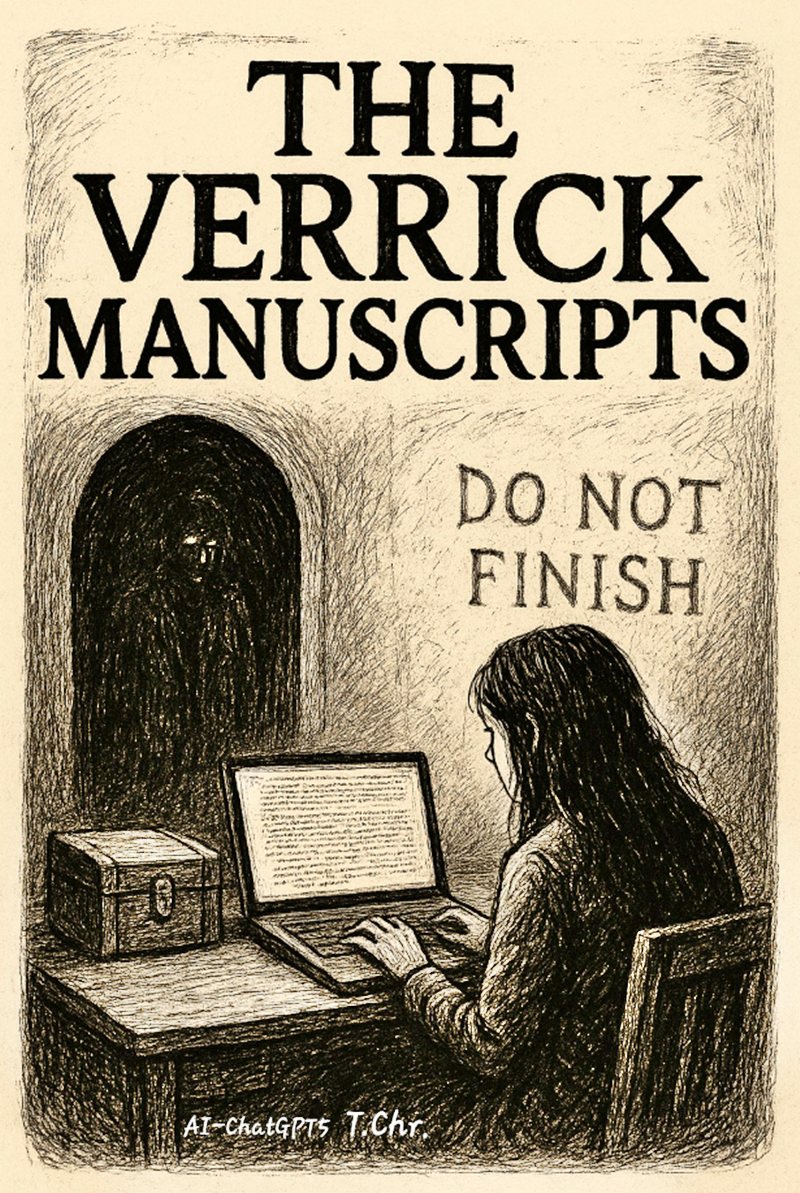THE VERRICK MANUSCRIPTS.

By T.Chr.-Human Synthesis-25 August 2025
The dangerous silence of a vanished author.
The first chest appeared in Prague in 1999, a decade after Elias Verrick’s supposed manuscripts had been whisked away into obscurity. It was a small cedar chest with brass fittings, auctioned quietly at an estate sale. The catalogue listed it only as “Author’s Papers, European, Mid-20th Century.” Most bidders assumed it was trivial—personal letters, receipts, maybe a few drafts of bad poetry.
A man calling himself Dr. Anton Keller bought it for the equivalent of sixty U.S. dollars. He was not a scholar but a collector of oddities: a cabinet of shrunken heads, a rosary carved from bone, a revolver with no barrel. He thought the papers would amuse him for an evening, nothing more.
Two weeks later, Keller’s neighbors reported hearing screams. The police found his apartment stripped of furniture, the walls covered in hand-drawn glyphs repeating a single phrase in German: Es liest mich. — It reads me. On the floor lay the opened chest. Inside were hundreds of pages of neat, typewritten text, the ink strangely vivid for its age. The manuscript bore no title. Only the name at the bottom of the first page: Elias Verrick. The manuscript vanished from the police archives before dawn.
Years passed before it surfaced again.In 2019, Lena Marceau, an archivist at the Bibliothèque Nationale in Paris, was working late when a colleague slid a folder across her desk and whispered, “Don’t read it all.” Inside were photocopied pages of that Prague manuscript. The prose was dense, written in shifting fragments, sometimes lyrical, sometimes mechanical.
It described a house with impossible architecture — staircases leading upward into darkness, doors that opened into the same room again and again. As Lena read, her pulse slowed, her eyes blurred, and she found herself mouthing the words aloud. She stopped only when she realized she was repeating the same line again and again: It reads me.
That night she dreamed of a corridor without end. At the far end stood a man in shadow, watching. When she woke, her desk bore three words carved into the wood, though she lived alone and owned no knife: DO NOT FINISH.
She told herself it was stress, imagination. But the itch grew unbearable. She began digging into Verrick’s past — the vanished German novelist, the rumors of chests filled with manuscripts that drove readers mad. Each lead ended in silence, each witness reluctant, as though they too had brushed against something dangerous.
Then, one night, her inbox pinged.
Subject: Do you want the rest?
From: no-reply@obscura.net
Attachment: verrick_chest3.pdf
The file required a password. The email body gave only one line: “Say the words and it opens.” Without thinking, Lena whispered: Es liest mich. — It reads me.The file unlocked. What spilled onto her screen was not a story but a maze of shifting text, letters rearranging themselves as she scrolled. The words pulsed like a heartbeat.
And beneath the text, faintly, she saw her own name forming and reforming, as if Verrick had written her into the manuscript decades before her birth.She tried to close the laptop. It would not shut down. The screen flickered, and in the reflection of the glass she saw not herself but Verrick, leaning over her shoulder, whispering in a language she did not know.
By morning, Lena was gone. Her apartment was immaculate, her belongings untouched — except the laptop, which remained open on the desk. The manuscript glowed faintly on the screen, the cursor blinking, waiting.The last line visible read:
“And now, you.”
Silence followed Verrick in life, and silence followed Lena after she vanished. Yet perhaps this was always the true lesson of the manuscripts: that art is not harmless, that words can wound as deeply as knives, and that sometimes the most radical refusal an artist can make is not to share, but to seal away.
We tell ourselves we deserve every story, that creation is our birthright. But Verrick’s ghost lingers as a warning: perhaps not all books are meant to be read. Some silences are not absences. They are defenses..
